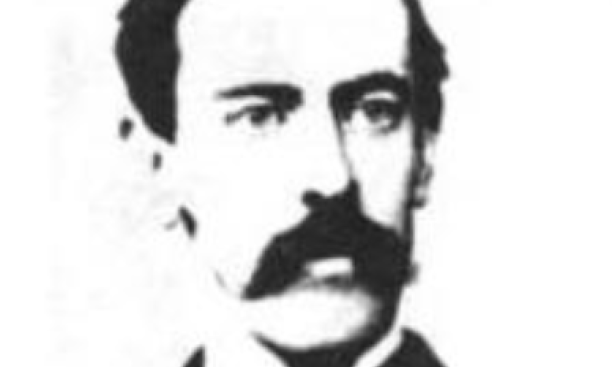
His mother didn’t want him to take the job. His fiancée feared it was beneath his dignity. Young Woodrow Wilson ’79 himself was reluctant to accept, but, as he wrote his betrothed, “beggars cannot be choosers.”
So in 1885 Wilson signed a contract to teach history at Bryn Mawr College. Though he had little sympathy with the idea of higher education for women, the 29-year-old scholar needed a job that would permit him to support a wife; and no other institution seemed willing to pay $1,500 to a graduate student sans doctorate, sans teaching experience.
“I should, of course, prefer to teach young men,” he wrote at the time, “and if I find that teaching at Bryn Mawr stands in the way of my teaching afterwards in some man’s college, I shall of course withdraw…” Meanwhile, at least he and his beloved Ellen Louise Axson would be able to marry and start a family.
Few people had heard of Bryn Mawr College in 1885, for that was its inaugural year. Established by a bequest from a wealthy Quaker, its purpose was to provide women an advanced education of the highest academic excellence, in accordance with the doctrines of the Society of Friends. Guiding the college from the outset was its dean of the faculty, M. Carey Thomas, a brilliant young Quaker who had received her doctorate summa cum laude from the University of Zurich and who insisted that each faculty member be of the highest caliber.
Dean Thomas had prompted Bryn Mawr’s offer to Wilson. The Princeton graduate, however, did not feel he could work under a woman a year younger than himself who was already further advanced in her career, and he took pains to ascertain that he might report directly to the president, James Rhoads. In fact, Wilson had a prejudice against the kind of “strong-minded female” that Thomas represented. As a “courteous Southern gentleman,” he sincerely believed that while women have certain talents of their own, they “have not the same gifts that men have. Their life must supplement men’s life.”
Although this attitude did not bode well for his happiness at Bryn Mawr, neither did it prevent him from fulfilling his duties conscientiously. According to one former student, Wilson was a brilliant speaker: “His lectures were fascinating and held me spell-bound; each was an almost perfect essay in itself, well-rounded and with a distinct literary style.”
Nonetheless, as the three years of his tenure went by, he became increasingly unhappy with his “demure Friendly damsels.” The teacher described by his students as “smiling and animated and always in a good humour,” complained in private that instructing women “relaxes one’s mental muscle.” He said that lecturing them on the history and principles of politics was “about as appropriate and profitable as would be lecturing to stone-masons on the evolution of fashion in dress.”
Wilson’s most grievous complaint was that the young women would not rise to his bait. “They are too docile. They just sit and take it all. There is no intellectual comeback.” Yet apparently he did not know how to elicit this kind of comeback: one student wrote, “It was clear that Mr. Wilson preferred to carry on the main discussion himself.” He himself admitted that he strive to dominate his graduate students. While grumbling that “to be all the year dominating” was “a strain and a bore,” he acknowledged no alternate pedagogical approach.
Lucy Maynard Salmon, one of Wilson’s graduate students and later one of Vassar’s most distinguished professors, wrote scathingly of his narrow-minded attitude toward women. Before Salmon arrived at Bryn Mawr, Cornell President Charles Kendall Adams had warned her not to expect much of Wilson: “Indeed I shall be very much surprised if you find he knows nearly so much history as you do; but if you remember that it is more blessed to give than to receive you will have no reason to be unhappy.”
Taking Adams’ advice, Salmon gave Wilson what he seemed most to want – deference. She later wrote, “he was singularly ill-adapted to teaching women. He had apparently never had any of the normal relationships of life with women, he assumed that women were quite different from me, and he made, I felt, no effort to understand them. He always assumed that they were intellectually different from men and that, therefore, they would not interest him. I am quite sure that he never whole-heartedly believed in college education for women. He once said to me that a woman who had married an intellectual, educated man was often better educated than a woman who had had college training. All of this used to amuse me and I never presented any other side of the subject to him or stated my own views – it would have been useless to do so. I felt his opinions were simply derived from a limited educational and social experience and hoped he would some time learn better!”
By 1887 Wilson was anxious to leave Bryn Mawr. He wrote Ellen, “When I think of you, my little wife, I love this 'College for Women,' because you are a woman: but when I think only of myself, I hate the place very cordially.” Having complete his doctorate at Dean Thomas’ insistence, he was now better able to seek a more congenial appointment.
Happily for his peace of mind, the Bryn Mawr trustees allowed Wilson to break his contract in order that he might accept a position at Wesleyan. He left in a jubilant spirit: “I am rather anxious than otherwise to be at work in the class-room. I have for a long time been hungry for a class of men.”
Three years Wilson had spent in what he considered a fruitless endeavor. What can one say of those three years? Poor Wilson…poor Bryn Mawr…
This was originally published in the March 4, 1975 issue of PAW.
